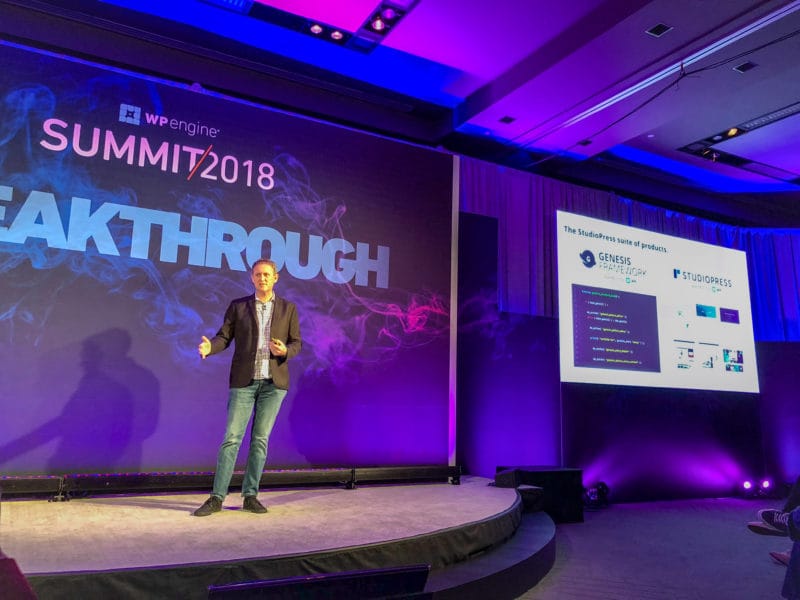
WP Engine Summit 2018 and the future of StudioPress
Posted on October 1, 2018
For the third year in a row, we were graciously invited to the WP Engine Summit in Austin, Texas to talk WordPress, learn about industry trends, and spend time with other digital agencies. Over the past three years, the summit has grown from a single day of talks with 50 attendees, to a three day conference with over 300 attendees!
Every year we look forward to attending because we get an awesome opportunity to chat with much larger agencies like RG/A and GSD&M (these are agencies with clients like Nike and Volkswagen). However, this year because of WP Engine’s recent acquisition of StudioPress, we attended with excited curiosity as to what the future of StudioPress’s Genesis framework might be.
A short history of StudioPress and why we’ve been building sites on Genesis since 2009.
Brian Gardner founded StudioPress in 2007. In 2010 StudioPress merged with Copy Blogger Media, the combined entity heavily focusing on value-added products and SASS based services like Premise, Scribe, Rainmaker, Synthesis and more. Over intervening years, the Genesis Framework remained the most popular framework for WordPress themes, and still is today. As Brian and Nathan Rice (Genesis lead developer) split their attention across many projects, they focused on mostly maintenance updates that kept the Genesis platform stable without introducing many new features. While we’ve evaluated other frameworks like Hybrid/Mythic and Roots (and others), we’ve continued to build Genesis sites every day because of how reliable the maintenance release cycle has been, and how solid the framework continues to be.
Genesis today
Moving up the timeline to late 2018, StudioPress, including much of it’s talent (Brian Gardner and Nathan Rice), was un-bundled from CopyBlogger Media and acquired by WP Engine, a company we love. We’ve been a customer of WP Engine since their founding in 2010, and an Agency Partner since 2015.
That’s why we were excited by WP Engine’s promise to invest in StudioPress and the Genesis Framework. Of course, we were watching this acquisition carefully considering that the majority of our clients and products rely on the platform.
Over the 3 days of the summit, we spent a lot of time talking with the new product team behind StudioPress and Genesis within WP Engine. Here’s what we learned from the c-suite, engineers, and everyone in between.
More development resources for Genesis
Post acquisition, there is a lot more dev talent focused on Genesis than has been in a long time. Nathan Rice has been freed from the competing priorities of CopyBlogger to focus exclusively on Genesis. Anthony Burchell (release lead for WP 4.9.9 and author of the Gutenberg’s Playlist Block), Mike McAlister and John Parris (both from Array Themes and authors of the most popular Gutenberg block library in the .org plugin repository, Atomic Blocks) have also joined the StudioPress team so we expect a lot of awesomeness going forward.
StudioPress brand and marketplace
We also learned during our time at the WP Engine Summit that the StudioPress brand and marketplace are staying around for the foreseeable future. The WP Engine partnership team is also working on making the StudioPress theme marketplace an even better place for 3rd party theme developers like 9seeds.
The big takeaway
The biggest takeaway from the WP Engine Summit this year was that the future is bright for both StudioPress and WP Engine. Genesis themes are by far the most popular themes on WP Engine for both small and enterprise sites, and the dependence of both brands on each other creates a symbiotic relationship that will only benefit the greater ecosystem, companies like 9seeds, and the clients we serve.

Speak Your Mind